Indonesia: Bali booms, Jakarta stable
Indonesian residential market prices are a picture of stability. The property price index (16 major cities) rose by 3.14% in 2018, according to Bank Indonesia, after rises of 3.5% in 2017, 2.38% in 2016, 4.62% in 2015 and 6.29% in 2014. However property prices are actually falling slightly, when adjusted for inflation.
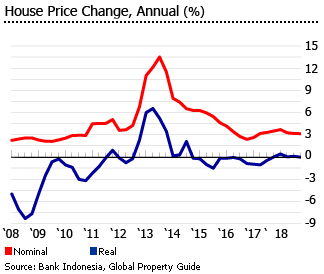
During the latest quarter, residential property prices rose by a meagre 0.5% (unchanged when adjusted for inflation).
Residential property has been attractive to rich Indonesians and others partly as a protection against inflation.
Seventeen of Indonesia’s 18 major cities saw nominal property price rises in 2018. However, when inflation is taken into consideration, only six cities actually recorded increases in value, ranging from just 0.05% for Pekanbaru to 1.6% for Bandung.
RESIDENTIAL PROPERTY PRICES IN INDONESIA’S MAJOR CITIES, Q4 2018 |
||||
| Y-O-Y Change (%) | Q-O-Q Change (%) | |||
| Major Cities | Nominal | Real | Nominal | Real |
| Bandung | 4.82 | 1.60 | 1.22 | 0.69 |
| Bandar Lampung | 3.31 | 0.13 | 3.00 | 2.46 |
| Banjarmasin | 1.87 | -1.26 | 0.24 | -0.28 |
| Denpasar | 1.15 | -1.96 | 1.10 | 0.57 |
| Palembang | 1.89 | -1.24 | 1.18 | 0.65 |
| Semarang | 2.26 | -0.89 | 0.78 | 0.25 |
| Yogyakarta | 1.65 | -1.48 | 0.33 | -0.19 |
| Padang | 0.67 | -2.42 | 0.19 | -0.33 |
| Medan | 4.57 | 1.35 | 0.21 | -0.31 |
| Makassar | 2.68 | -0.48 | 0.01 | -0.51 |
| Manado | 2.34 | -0.80 | 1.57 | 1.04 |
| Surabaya | 4.60 | 1.39 | 0.00 | -0.52 |
| Pontianak | 0.77 | -2.33 | 0.44 | -0.08 |
| Batam | 4.21 | 1.01 | 2.65 | 2.11 |
| Balikpapan | -0.76 | -3.82 | 0.01 | -0.51 |
| Jabodebek - Banten | 3.14 | -0.03 | 0.24 | -0.28 |
| Pekanbaru | 3.22 | 0.05 | 0.15 | -0.37 |
| Samarinda | 1.39 | -1.73 | -0.66 | -1.18 |
| Composite 18 Cities | 3.14 | -0.03 | 0.52 | -0.01 |
| Sources: Bank Indonesia, Global Property Guide | ||||
In Jakarta, prices of strata title apartments rose by 2% during the year to Q3 2018 to an average of IDR 33.4 million (US$2,395) per square metre (sq. m.) – the slowest growth since Q2 2010, according to Colliers International.
Indonesia´s economy grew by a healthy 5.15% in 2018, at par with the previous year´s 5.07% growth. The Indonesian economy is expected to remain strong this year, with GDP growth of 5% to 5.4% expected, according to Bank Indonesia.
Jakarta’s apartment prices rising modestly
Jakarta’s apartment market remains healthy, with prices rising by 2.1% y-o-y to IDR 33.4 million (US$2,393) per sq. m. in Q3 2018, according to Colliers International.
- In Jakarta CBD, the average price of strata title apartments rose by 1.69% y-o-y to IDR 51.3 million (US$3,679) per sq. m. in Q3 2018.
- In South Jakarta, the average price of strata title apartments rose by 1.22% y-o-y to IDR 38.4 million (US$2,754) per sq. m. in Q3 2018.
- In the capital’s non-prime areas, the average price of strata title apartments rose by 1.84% y-o-y to IDR 25.3 million (US$1,810) per sq. m. over the same period.
For newly-launched apartment projects in Jakarta:
In Southgate Residence (Prime Tower), located in Jl. Tanjung Barat Raya, Jagakarsa, South Jakarta, apartment prices stood at IDR 39 million (US$2,798) per sq. m. in Q3 2018, according to Colliers International. The project offers 189 units and is scheduled for completion in 2020.
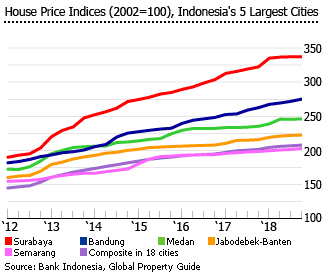
In South Quarter Residence, situated in Jl. R.A. Kartini, Cilandak Barat, South Jakarta, apartments are currently offered for IDR 39 million (US$2,798) per sq. m. It is expected to be completed in 2022.
In Apple Residence, located in Jatipadang, South Jakarta, the average price of apartments was IDR 22 million (US$1,578) per sq. m. The project offers 300 units and is scheduled for completion in 2020.
In Puri 8 Residence, located in Duri Kosambi, West Jakarta, apartment prices stood at IDR 15.5 million (US$1,112) per sq. m. The project offers 1,094 units and is scheduled for completion in 2022.
In Sakura Garden City (Cattleya Tower), situated in Bina Marga, East Jakarta, apartments are offered for IDR 15 million (US$1,076) per sq. m. The project offers 550 units and is scheduled for completion in 2022.
AVERAGE APARTMENT PRICES IN JAKARTA, Q3 2018 |
||||
| Area | Y-O-Y (%) | Q-O-Q (%) | Average price (IDR)/sq. m. | Average price (USD)/sq. m. |
| CBD | 1.69 | 1.12 | 51,323,657 | 3,679 |
| South Jakarta | 1.22 | 0.63 | 38,424,532 | 2,754 |
| Non-prime area | 1.84 | 0.18 | 25,251,943 | 1,810 |
| Average | 2.10 | 0.56 | 33,387,927 | 2,393 |
| Source: Colliers International | ||||
Bali’s stunning growth
Bali is one of Indonesia’s wealthiest regions, and saw unprecedented property price increases in recent years. About 80% of Bali’s economy depends on tourism. Global media attention hasn’t harmed it, including the 2010 movie "Eat, Pray, Love". An estimated 30,000 expatriates live in Bali.
Six years ago, a four-bedroom villa built in a freehold land in Berawa was priced between USD600,000 and US$700,000. Now, that same villa is worth USD1.7 million.
"Bali has, over 10 to 12 years, been the best-performing real estate class in terms of vacant land appreciation in the world," said Matthew Georgeson of Elite Havens. This is mainly due to planning restrictions that limit building height to four storeys.
Villas in Bali are priced at around US$1,100 to US$2,300 per sq. m. last year.
- In BASK, a luxury beachfront villa resort on the island of Gili Meno, prices range from USD210,000 for studio to USD1.2 million from three-bedroom villa.
- In Seminyak resort, a three-bedroom villa is priced from USD875,000.
- In South Bukit, a high-end, cliff-front villa is priced from USD6.5 million.
Indonesia’s strong economy is expected to continue to buoy property demand in Bali, causing prices to continue climbing.
Sales have been surging
Residential property sales surged 20.15% y-o-y in Q3 2018, sharply up from a decline of 34.53% during the same period last year, according to Bank Indonesia. However during the latest quarter (Q3 2018), sales actually fell by 14.14%.
Small properties led the demand surge (sales growth of 29.32%), followed by medium houses (9.76%) and big houses (2.34%).
Partly to buoy property demand, the government has cut the key interest rate, given tax incentives to Indonesian REITs, eased restrictions on individual foreign ownership, increased the loan-to-value ratio, and increased the threshold for luxury property tax.
The average take-up rate for apartments in Jakarta increased slightly to 85.9% in Q3 2018, from 85.6% in the same period last year, according to Colliers International, and is likely to rise further.
NEWLY COMPLETED APARTMENT PROJECTS IN JAKARTA, Q3 2018 |
||||
| Name | Location | Region | Developers | No. of Units |
| Anandamaya Residences | Jl. Jenderal Sudirman | CBD | JV. Astra Land-Hongkong Land | 509 |
| Lavie Suites | Jl. Denpasar Raya | CBD | Wilsor Group | 302 |
| Ciputra International (San Francisco Tower) | Jl. Lingkar Luar Barat | West Jakarta | Ciputra | 335 |
| Nine Residences | Warung Buncit | South Jakarta | Lippo Group | 246 |
| Source: Colliers International | ||||
Tax Amnesty Program is boosting the real estate market
Real estate has been boosted by a huge Tax Amnesty (Pengampunan Pajak) - Law No. 11 Year 2016 - ending in March 31, 2017, which covered:
- Income tax (Pajak Penghasilan);
- Value added tax (Pajak Pertambahan Nilai), and;
- Luxury Goods Sales Tax (Pajak Penjualan atas Barang Mewah).
TAX AMNESTY PROGRAM |
|||
| Target | Actual | Achievement | |
| Redemption Payments | IDR 165 trillion | IDR 114 trillion | 69.1% |
| Declaration of Funds | IDR 4,000 trillion | IDR 4,866 trillion | 121.6% |
| Repatriation of Funds | IDR 1,000 trillion | IDR 147 trillion | 14.7% |
| Source: DirektoratHYPERLINK "http://www.pajak.go.id/statistik-amnesti" Jenderal Pajak Kementerian Keuangan | |||
"The key issue in the Indonesian residential property market currently is that buyers of mid- to high-end residential properties have large amounts of undeclared income," said Bernard Kie and Hasira de Silva of Fitch Corporate Ratings Group in Jakarta and Singapore.
"The imposition of the tax amnesty should help overcome this and encourage buyers to declare more of their income, thereby stoking fresh demand."
While no official figures are available, Indonesia Property Watch predicted that about 60% of all repatriated funds would be invested in property, particularly at the luxury end. This was supported by Thomas Angfendy of Metropolitan Land, who said that the amnesty program has increased sales for the higher-middle class and high-end residential segments but not in the lower segments.
A total of 965,983 people joined the tax amnesty program, earning forgiveness by paying a limited amount of outstanding taxes. About IDR 4,865.7 trillion (US$ 349 billion) worth of assets was declared to Indonesia’s Tax Office, equivalent to nearly 40% of the country’s GDP. However, in terms of asset repatriations, the program received only 15% of target, with IDR 147 trillion (US$10.55 billion) repatriations.
Repatriated offshore assets must be invested in Indonesia in defined instruments, and stay three years in the country. The funds are needed to directly finance Jokowi’s ambitious infrastructure programs, which include building ports, roads and railways - but the real estate market is a major beneficiary.
Foreign ownership rules
In December 2015, Regulation No. 103/2015 on House Ownership of Foreigners Residing in Indonesia allowed foreigners to own landed houses in Indonesia for a period up to 80 years. Under the law, foreigners can now purchase a landed house or an apartment under the so-called "right-of-use" (hak pakai) title for an initial period of 30 years. The foreigner can extend the ownership twice - by 20 years and then by another 30 years. However, if the foreigner (or his heir) leaves Indonesia to reside in another country, then he/she needs to release or transfer the ownership rights to another person who meets all requirements.
The new regulations have bouyed investor confidence and expand the local real estate market to international homebuyers.
Currently, land titles (hak milik) can only be held by Indonesian citizens. Foreign land ownership is against the constitution.
For apartments, the 1996 regulation (No. 41/1996) states that foreigners who reside in Indonesia, or visit the country regularly for business purposes, can purchase a home, apartment or condominium as long as it isn’t a part of a government-subsidized housing development. Again, foreigners can only hold land-use (hak pakai) deeds, and most developments hold right-to-build deeds (hak guna bagunan). It is not possible for someone to have a land-use deed for a sub-unit of a right-to-build deed. The length of these titles varies as well. Therein lie some of the difficulties and unclear ownership issues.
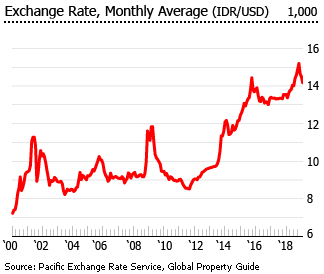
So foreigners can effectively only lease, but not truly own, an apartment for up to 70 years. Within this 70-year period, foreigners must also periodically renew their right to use. The initial hak pakai period is for 25 years, then renewed for an additional 25 years and finally 20 years.
Additionally, the threshold or minimum property sales price that a foreigner can purchase is IDR 1.5 billion, which is around US$105,000. This minimum "purchase" price is quite high in the Indonesian context.
Mortgage rates falling despite the central bank’s rate hikes
In October 2018, the average interest rate for rupiah-denominated housing loans stood at 9.29%, down from 10.09% a year earlier, according to the Financial Services Agency (OJK).
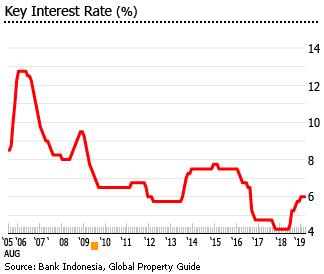
This is surprising, because Bank Indonesia had six interest rate hikes in 2018. From a record low of 4.25%, the central bank raised the key rate twice in May 2018 to 4.75%; to 5.25% in June; to 5.5% in August; to 5.75% in September; and finally to 6% in November.
The central bank’s tightening monetary instance was mainly aimed to curb further sell-off in the rupiah, amidst rising U.S. Treasury yields and an escalation in global trade tensions.
Despite these rate rises, mortgage rates continue to fall. By bank group (as of Q3 2018):
- State-owned banks: 10.04%, down from 10.2% in the previous quarter
- Private national banks: 9.7%, down from 9.99% in the previous quarter
- Foreign banks and joint banks: 6.82%, down from 7.97% in Q2 2018
- Regional state-owned banks: 12.21%, slightly down from 12.38% in the previous quarter
Mortgage market small
When buying small and medium houses, 77.2% of respondents used mortgage loans in Q3 2018, up from 76.42% a year earlier. About 15.12% make progressive payments, while 7.69% buy using hard cash, according to the central bank’s Q3 2018 Residential Property Survey. Despite this, the share of mortgage credits to GDP remains small, at around 2.96% in 2018, according to Bank Indonesia.
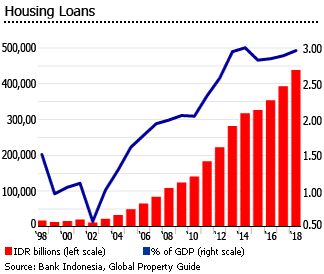
Indonesian developers find financing challenging. Memories of the Asian crisis are still vivid. Banks tend to be extremely cautious in extending housing loans to the real estate industry, although Indonesian banks are strong and adequately capitalized.
That’s why as of Q3 2018:
- 55.73% of residential property development projects were financed internally
- Only 33.95% were financed through bank loans
- 8.69% of projects were financed by consumer payments (pre-selling)
Rental yields good, but property investment may be unattractive for foreigners
Gross rental yields in Jakarta - the return earned on the purchase price of a rental property, before taxation, vacancy costs, and other costs - are now very attractive, though lower than they were four to five years ago.
Gross rental yields on high-end properties in Jakarta range from 7.4% to 8.5%, according to Global Property Guide research conducted in July 2018. Yet due to strong demand for high-end apartments, prices have risen significantly in recent years, eventually causing lower rental yields than the 10% to 13% yields prevailing five years ago.
Gross rental yields are an important consideration even for those who do not intend to become landlords, because a high rental yield indicates that the property market is reasonably priced.
On Bali, lower rental yields can be earned, ranging from 3.8% to 5.0%.
Residential rents are steady. In Q3 2018, the average rent for apartments located in the CBD was IDR367,947 (US$26) per sq. m. while it was IDR226,319 (US$16) per sq. m. in South Jakarta and other non-prime areas, according to Colliers International.
Property investment in Indonesia remains unattractive, due to high tax rates
Despite the high rental yields, property investment is still relatively unattractive for foreigners, because of complex legalities and high tax rates on non-resident owners.
- The tax levied on the average annual income on a rental apartment/property in Indonesia is 20% which is the third highest in Asia, only after Bangladesh (25%) and Malaysia (22.4%).
- A 10% Value-added tax (VAT) is levied on gross rental income.
- Capital gains realized by individuals from the sale of real property in Indonesia are taxed at a flat rate of 5%. The tax base is the transfer value of the property, without any deductions.
- Sales of luxury houses, apartments, townhouses, and condominium units are subject to 20% sales tax. Luxury houses and townhouses have a selling price of IDR20 billion (US$1.5 million) and above. Luxury apartments and condominium units have a selling price of IDR10 billion (US$750,000) and above.
- Property tax is levied at 0.5% on the assessed value of the property. The assessment value of taxable property is determined as a percentage of the deemed fair market value of the property.
The total cost of buying and then re-selling a residential property (including Registration costs, Real estate agent fees, Legal fees, Sales and transfer taxes), is one of the highest in the region (see Indonesian round-trip property purchase costs, compared to the region).
However, changes in the law are in process which should make things much easier.
Almost two decades of uninterrupted economic growth
Indonesia’s economy is very domestically-driven. It tends to be insulated from global economic trends. In fact in recent years, Indonesia has enjoyed robust growth despite the global crisis. From 2007 to 2017, the economy grew by an average of 5.7% per year, according to the International Monetary Fund (IMF).
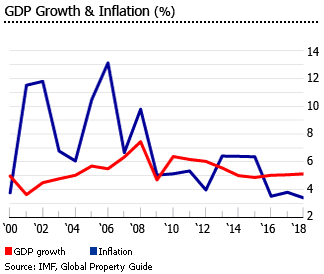
The Indonesian economy is expected to remain strong this year, with a projected GDP growth rate of 5% to 5.4%, according to Bank Indonesia.
Tourist arrivals surged 12.6% to 15,806,191 people in 2018 from a year earlier.
The Indonesian rupiah appreciated by 7.2% against the US dollar in the past three months to reach an average exchange rate of IDR 14,172.4 = USD 1 in January 2019, thanks to the central bank’s efforts to defend the domestic currency amidst rising current account deficit and worsening global trade tensions. However, the recent gain is not enough to offset the 13.7% drop in its value against the US dollar from September 2016 to October 2018.
Indonesia recorded a budget deficit equal to 1.76% of GDP in 2018, down from shortfalls of 2.51% in 2017, 2.46% in 2016, and 2.58% in 2015, according to the Ministry of Finance. The country’s government debt stood at just about 30% of GDP last year.
In Q3 2018, unemployment stood at 5.34%, almost unchanged from a year earlier, according to the country’s statistics agency, Badan Pusat Statistik Indonesia (BPS).
In 2018, overall inflation was 3.13, amidst stable administered prices of commodities such as fuel and electricity, according to the BPS. From an average of 9.5% from 2001 to 2008, inflation dropped to an annual average of 5.1% from 2009 to 2017, according to the IMF. The overall decline in inflation suggests that the stepping-up in the key interest rate 2013-2016 worked, that Indonesia’s growing economy is becoming more flexible and productive as it grows.
In January 2019, inflation fell further to 2.82%, amidst the government’s promise to not raise fuel prices - a populist move ahead of the 2019 general elections.
Jokowi’s Presidency
Joko Widodo ("Jokowi"), the Democratic Party nominee, became president of Indonesia on 20 October 2014. A man of the people, a campaigner for clean government, and a highly successful and popular former mayor of Jakarta, Jokowi is a symbol of the demand for reform which is increasingly sweeping Indonesia.
Quite aside from his popular appeal, and his "blusukan" - regular visits to poor areas across Jakarta wearing simple informal clothes and chatting to people about problems like the price of food, housing, local and flooding and transport problems - Jokowi was an effective reformer during his time as mayor, creating a bureaucratic recruitment system called "lelang jabatan", giving every civil servant the same opportunities by fulfilling the required qualifications and passing the test, whose results were announced transparently.
Jokowi is popular for his ambitious infrastructure programme, which include 222 projects involving the construction and building of roads, railways, bridges, power stations, oil refining plants, seaports, airports, dams, and more. Of these, over 20 have been completed and 127 are under construction.
Jokowi previously introduced a "Healthy Jakarta card" for health insurance, inaugurated the construction of the Jakarta MRT, and re-started the construction of the green line of the Jakarta Monorail. He also initiated programs aimed towards transparency, such as online taxes, e-budgeting, e-purchasing, and a cash management system.
Jokowi was supported by former president Megawati Sukarnoputri, and almost half his cabinet appointees were her people, which has disappointed many observers. But given a largely hostile legislature stuffed with vested interests, Jokowi faces tough challenges in moving ahead with his reform agenda.
He has been keeping his reform promises. He has raised the government-subsidized petrol price by more than 30%. Previously fuel subsidies had consumed US$21 billion, or 13% of Indonesia’s national budget. Wealthy car drivers, who make up a tiny fraction of Indonesia’s 250 million population, benefited the most from cheap petrol, as well as smugglers. Jokowi promised to cushion the effect of the price rise for poorer Indonesians by distributing benefits through its new education, health and welfare cards.
The government is currently implementing a land reform, which involves the distribution of land certificates to the poor and offering lower taxes and financial services to buoy small businesses.
Jokowi is seeking a second and final term in office in the next general elections to be held in April 2019.
Sources:
- World Economic Outlook Database October 2018 (International Monetary Fund): https://www.imf.org/external/pubs/ft/weo/2018/02/weodata/index.aspx
- Residential Property Survey (Bank of Indonesia): https://www.bi.go.id/en/publikasi/survei/harga-properti-primer/Default.aspx
- Jakarta, Surabaya, and Bali Property Market Report (Colliers International): https://www.colliers.com/en-gb/indonesia/insights
- Indonesia’s GDP growth seen slowing slightly in fourth quarter: Reuters poll (Reuters): https://www.reuters.com/article/us-indonesia-economy-gdp/indonesias-gdp-growth-seen-slowing-slightly-in-fourth-quarter-reuters-poll-idUSKCN1PQ3TH
- Bank Indonesia keeps key interest rate on hold at 6 pct (EconoTimes): https://www.econotimes.com/Bank-Indonesia-keeps-key-interest-rate-on-hold-at-6-pct-1501062
- BI 7-day (Reverse) Repo Rate (Bank Indonesia): https://www.bi.go.id/en/moneter/bi-7day-RR/data/Contents/Default.aspx
- Jakarta’s rental yields are attractive (Global Property Guide): https://www.globalpropertyguide.com/Asia/Indonesia/Rental-Yields
- Indonesia Unemployment Rate (Trading Economics): https://tradingeconomics.com/indonesia/unemployment-rate
- Indonesia Government Budget (Trading Economics): https://tradingeconomics.com/indonesia/government-budget
- Economic Growth of Indonesia Fourth Quarter 2018 (Badan Pusat Statistik Indonesia): https://www.bps.go.id/pressrelease/2019/02/06/1619/ekonomi-indonesia-2018-tumbuh-5-17-persen.html